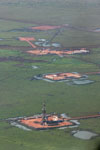
There has been a flurry of news out of South Sudan that made international headlines this week, including a couple that focus on pivotal issues in post-referendum Sudan.
Reuters reported that an independent southern Sudan would take a hard look at current oil contracts with foreign companies and potentially “ask some of these companies to give way for newcomers” if they don’t meet the government’s standards. The story quoted South Sudanese Minister of Presidential Affairs Luka Biong Deng, who made waves last month in an interview with the Financial Times when he suggested that the 50-50 oil-sharing arrangement between North and South currently in place per the CPA could continue after the referendum. This time, the minister (who worked for the World Bank in southern Sudan before joining the government) addressed the issues of war-time business contracts between the Khartoum government and foreign oil firms. Minister Biong said that specifically the southern Sudanese government was concerned about environmental damage related to the existing contracts, as well as sky-high profits for the firms given the fact that the contracts were negotiated years ago when oil prices were much lower than the current $80 per barrel. Reuters reported the minister saying:
They [the foreign oil companies] are using the contracts that they have now with the mindset ‘Get out as much as you can and you can talk about it later on’…We [the South Sudanese government] don’t want to send a wrong signal that we are going to cancel all the contracts but we are going to engage with them logically and in an informed way.
In another Reuters interview, Elijah Malong, governor of the Bank of South Sudan, said that in the immediate post-referendum future, southern Sudan will likely continue to use “the present currency.” Mr. Malong also floated the idea of a temporary dollarization of the economy, which is already partly in effect in southern Sudan, where high prices for expatriate amenities like air- conditioned hotel rooms and 4×4 car rentals necessitate the use of crisp U.S. dollar bills printed after 2006. (I have personally not found an answer to the question of why post-2006 bills are required for Juba transactions.) A quick survey of the Ethiopia-Eritrean conflict yields a lesson for Sudan about the hot-button issue of currency… I expect that this won’t be the last word from the southern government on the post-referendum currency question.
Photo: Oil platforms in South Sudan (AP)

